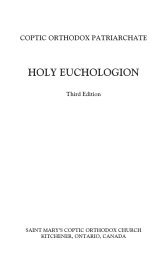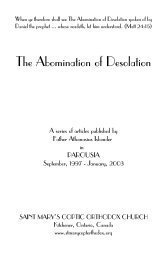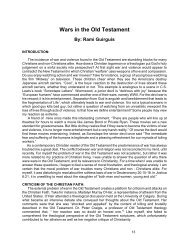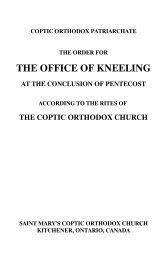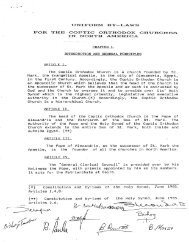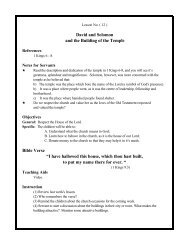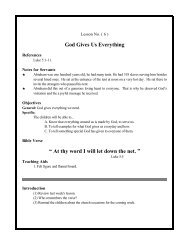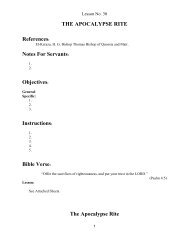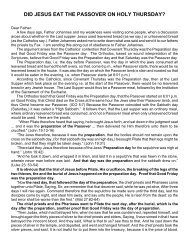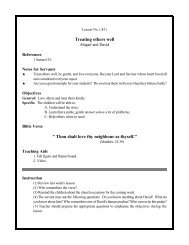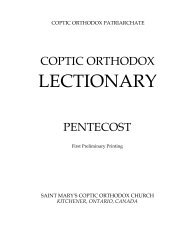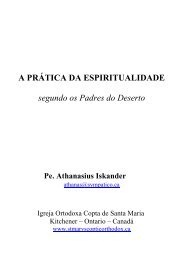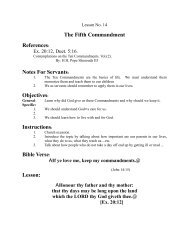the Nicene/Post Nicene Fathers - St. Marys Coptic Orthodox Church
the Nicene/Post Nicene Fathers - St. Marys Coptic Orthodox Church
the Nicene/Post Nicene Fathers - St. Marys Coptic Orthodox Church
You also want an ePaper? Increase the reach of your titles
YUMPU automatically turns print PDFs into web optimized ePapers that Google loves.
COPTIC ORTHODOX PATRIARCHATE<br />
SAINT MARY’S COPTIC ORTHODOX CHURCH<br />
388 Ottawa <strong>St</strong>. S. Kitchener, ON Canada N2M 3P4<br />
www.stmaryscopticorthodox.ca E-mail: athanas@sympatico.ca<br />
Fa<strong>the</strong>r Athanasius Iskander (519) 740-7627 Fax (519) 621-1444<br />
VOLUME XVII OCTOBER 2007 NUMBER 6<br />
THE NICENE AND POST NICENE FATHERS<br />
INTRODUCTION:<br />
Reading <strong>the</strong> Fa<strong>the</strong>rs is essential but can be very confusing. Some<br />
claim that reading <strong>the</strong> Bible is enough. Sola Scriptura is <strong>the</strong> creed of<br />
most Protestants, and yet, <strong>the</strong>y read Lu<strong>the</strong>r and Calvin and a host of<br />
o<strong>the</strong>rs. The problem with Sola Scriptura is in <strong>the</strong> interpretation of <strong>the</strong><br />
scriptures. All of <strong>the</strong> heretics were very well versed in <strong>the</strong> scriptures and<br />
<strong>the</strong>y used <strong>the</strong>m very effectively to spread <strong>the</strong>ir heresies. The problem<br />
was that <strong>the</strong>y misinterpreted <strong>the</strong> scriptures. The Fa<strong>the</strong>rs of <strong>the</strong> <strong>Church</strong><br />
took on those heretics and fought <strong>the</strong>m by showing <strong>the</strong> proper<br />
interpretation of <strong>the</strong> scriptures, and herein lies <strong>the</strong> importance of <strong>the</strong><br />
writings of <strong>the</strong> Fa<strong>the</strong>rs.<br />
But as we said, reading <strong>the</strong> fa<strong>the</strong>rs can be confusing, since<br />
sometimes <strong>the</strong>y contradict each o<strong>the</strong>rs and sometimes <strong>the</strong>y even<br />
contradict <strong>the</strong>mselves. So, where do we go from here? The first thing<br />
is that we have to realize that <strong>the</strong> fa<strong>the</strong>rs are not infallible, and that<br />
some are more fallible than o<strong>the</strong>rs. So, it is in <strong>the</strong> consensus of <strong>the</strong>ir<br />
views that we can find <strong>the</strong> truth.<br />
How do we know which Fa<strong>the</strong>rs are more to be trusted than <strong>the</strong><br />
rest? In our own <strong>Coptic</strong> <strong>Orthodox</strong> <strong>Church</strong>, we can find this out from<br />
our Liturgical Tradition. In <strong>the</strong> Absolution said after <strong>the</strong> Prayer of<br />
Thanksgiving, <strong>the</strong> priest says:
May Thy servants, ministers of this ..., be absolved from <strong>the</strong><br />
mouth of <strong>the</strong> All-Holy Trinity)<strong>the</strong> Fa<strong>the</strong>r and <strong>the</strong> Son and <strong>the</strong><br />
Holy Spirit; and from <strong>the</strong> mouth of <strong>the</strong> One, Only, Holy,<br />
Catholic and Apostolic <strong>Church</strong>; and from <strong>the</strong> mouths of <strong>the</strong><br />
twelve Apostles; and from <strong>the</strong> mouth of <strong>the</strong> Beholder of God,<br />
Saint Mark <strong>the</strong> Evangelist, <strong>the</strong> Apostle and martyr; <strong>the</strong><br />
patriarch Saint Severus, our teacher Dioscorus, Saint<br />
Athanasius <strong>the</strong> Apostolic, Saint Peter <strong>the</strong> martyr among <strong>the</strong><br />
priests and <strong>the</strong> high priest, Saint John Chrysostom, Saint<br />
Cyril, Saint Basil, and Saint Gregory; and from <strong>the</strong> mouths of<br />
<strong>the</strong> three hundred and eighteen assembled at Nicea, <strong>the</strong> one<br />
hundred and fifty at Constantinople, and <strong>the</strong> two hundred at<br />
Ephesus<br />
The fa<strong>the</strong>rs from whose mouth we ask <strong>the</strong> absolution are those whom<br />
we should put in a place of pre-eminence among <strong>the</strong> rest. These are:<br />
1. Saint Severus<br />
2. Saint Dioscorus<br />
3. Saint Athanasius <strong>the</strong> Apostolic<br />
4. Saint Peter <strong>the</strong> martyr among <strong>the</strong> priests<br />
5. Saint John Chrysostom<br />
6. Saint Cyril <strong>the</strong> Pillar of <strong>the</strong> Faith<br />
7. Saint Basil<br />
8. Saint Gregory <strong>the</strong> Theologian<br />
9. The Fa<strong>the</strong>rs of <strong>the</strong> three ecumenical councils acknowledged by our<br />
<strong>Church</strong>.<br />
This is what I call “The Safe Fa<strong>the</strong>rs List”<br />
The o<strong>the</strong>r fa<strong>the</strong>rs who are not on <strong>the</strong> “List” have to be measured<br />
by <strong>the</strong> writings of <strong>the</strong>se pre-eminent Fa<strong>the</strong>rs. If <strong>the</strong>re is a disagreement<br />
with <strong>the</strong>se pre-eminent fa<strong>the</strong>rs, <strong>the</strong> writings of <strong>the</strong> latter should take<br />
precedence.<br />
There is also ano<strong>the</strong>r measure by which we can evaluate <strong>the</strong><br />
writings of any of <strong>the</strong> Fa<strong>the</strong>rs; <strong>the</strong> agreement between <strong>the</strong>ir writings and<br />
<strong>the</strong> Liturgy. And by <strong>the</strong> Liturgy I mean <strong>the</strong> Liturgy of <strong>the</strong> Baptism, that<br />
of matrimony in addition of course to <strong>the</strong> Liturgy of <strong>the</strong> Eucharist.<br />
The purpose of this series is to present <strong>the</strong> most important of <strong>the</strong><br />
2
writings of those fa<strong>the</strong>rs, with a view of reading <strong>the</strong>m critically;<br />
accepting those writings that are deemed orthodox as determined by<br />
<strong>the</strong> criteria we st above, and rejecting <strong>the</strong> o<strong>the</strong>rs as ei<strong>the</strong>r non orthodox<br />
or controversial.<br />
For those who do not own a printed copy of Ante <strong>Nicene</strong>, <strong>Nicene</strong><br />
and <strong>Post</strong> <strong>Nicene</strong> Fa<strong>the</strong>rs, here is a Link :<br />
http://www.bible.ca/history/fa<strong>the</strong>rs/<br />
Fa<strong>the</strong>r Athanasius Iskander<br />
AUGUSTINE OF HIPPO (354-430)<br />
BIOGRAPHY:<br />
Born in 354 in Thagaste (present-day Souk Ahras, Algeria), He<br />
studied rhetoric in near-bye Carthage. His mo<strong>the</strong>r, Monica, was a<br />
devout Christian, and his fa<strong>the</strong>r, Patricius, a pagan. Although raised as<br />
a Christian, Augustine left <strong>the</strong> <strong>Church</strong> to follow <strong>the</strong> Manichaean<br />
religion, a dualistic Persian religion centred about a good God and an<br />
evil God.<br />
As a youth Augustine lived a hedonistic lifestyle for a time and, in<br />
Carthage, he developed a relationship with a young woman who would<br />
be his concubine for over fifteen years. During this period he had a son,<br />
Adeodatus.<br />
In 383 he moved to Rome, and one year later, at age thirty, he<br />
became a professor of rhetoric for <strong>the</strong> imperial court at Milan. It was<br />
<strong>the</strong>re that he became a Christian, through <strong>the</strong> preaching of <strong>the</strong> bishop<br />
Saint Ambrose and <strong>the</strong> fervent prayers of his mo<strong>the</strong>r Saint Monica.<br />
In 386, after having read an account of <strong>the</strong> life of Saint Anthony<br />
which greatly inspired him, Augustine underwent a profound personal<br />
crisis and decided to convert to Christianity, abandon his career in<br />
rhetoric, quit his teaching position in Milan, and devote himself entirely<br />
to serving God and <strong>the</strong> practices of priesthood, which included celibacy.<br />
Saint Ambrose baptized Augustine, along with his son, Adeodatus,<br />
on Easter Vigil in 387 in Milan, and soon <strong>the</strong>reafter in 388 he returned<br />
to Africa. On his way back to Africa his mo<strong>the</strong>r died, as did his son soon<br />
after, leaving him alone in <strong>the</strong> world without family.<br />
3
Upon his return to north Africa he created a monastic foundation<br />
at Tagaste for himself and a group of friends. In 391 he was ordained<br />
a priest in Hippo (Algeria). He became a famous preacher, and in 396<br />
he was made bishop of Hippo.<br />
Augustine died on August 28, 430, at <strong>the</strong> age of 75, during <strong>the</strong><br />
siege of Hippo by <strong>the</strong> Vandals, who were Arians.<br />
WORKS:<br />
Augustine was one of <strong>the</strong> most prolific Latin authors, and <strong>the</strong> list<br />
of his works consists of more than a hundred separate titles. They<br />
include apologetic works against <strong>the</strong> heresies of <strong>the</strong> Arians, Donatists,<br />
Manichaeans and Pelagians, texts on Christian doctrine, exegetical<br />
works such as commentaries on Genesis, <strong>the</strong> Psalms and Saint Paul's<br />
Letter to <strong>the</strong> Romans, many sermons and letters, and <strong>the</strong> Retractions,<br />
a review of his earlier works which he wrote near <strong>the</strong> end of his life.<br />
Apart from those, Augustine is probably best known for his Confessions<br />
which is a personal account of his earlier life, and for The City of God,<br />
consisting of 22 books, which he wrote to restore <strong>the</strong> confidence of his<br />
fellow Christians, which was badly shaken by <strong>the</strong> sack of Rome by <strong>the</strong><br />
Visigoths in 410.<br />
THEOLOGICAL CONTRIBUTIONS:<br />
Augustine introduced Platonism into Western Christianity,<br />
something Origen introduced into Eastern Christianity two centuries<br />
earlier. Saint Athanasius <strong>the</strong>ology succeeded in freeing Eastern<br />
Christianity from Greek Philosophy half a century before Augustine<br />
introduced it into Wesern Christianity.<br />
Augustine’s concept of original sin was expounded in his works<br />
against <strong>the</strong> Pelagians. However, Eastern <strong>Orthodox</strong> <strong>the</strong>ologians, while<br />
<strong>the</strong>y believe all humans were damaged by <strong>the</strong> original sin of Adam and<br />
Eve, have key disputes with Augustine about this doctrine, and as such<br />
this is viewed as a key source of division between East and West. His<br />
writings helped formulate <strong>the</strong> <strong>the</strong>ory of <strong>the</strong> just war. He also advocated<br />
<strong>the</strong> use of force against <strong>the</strong> Donatists (a heretic sect)<br />
Augustine’s doctrine of divine predestination would later become<br />
<strong>the</strong> inspiration of Martin Lu<strong>the</strong>r and John Calvin.<br />
Augustine’s vision of <strong>the</strong> heavenly city has influenced <strong>the</strong> secular<br />
projects and traditions of <strong>the</strong> Enlightenment, Marxism, Freudianism<br />
4
and Eco-fundamentalism.<br />
Augustine of Hippo does not have an entry in our Synaxarion,<br />
nei<strong>the</strong>r is he mentioned in our Liturgy.<br />
THE CONFESSIONS:<br />
A work of great devotional and philosophical value in which <strong>the</strong>re<br />
is an outline of <strong>the</strong> author’s life up to his mo<strong>the</strong>r’s death. It was written<br />
ten years after his baptism. The purpose of writing it is clearly explained<br />
in <strong>the</strong> fourth section of his Tenth Book. It was that <strong>the</strong> impenitent on<br />
reading it might not say, “I cannot,” and “sleep in despair,” but ra<strong>the</strong>r<br />
that, looking to that God who had raised <strong>the</strong> writer from his low estate<br />
of pride and sin, he might take courage, and “awake in <strong>the</strong> sweetness of<br />
His grace, by which he that is weak is made strong;” and that those no<br />
longer in sin might rejoice and praise God.<br />
The confessions are in thirteen books. <strong>St</strong>arting from book 11,<br />
Augustine inserts some exegetical writings about <strong>the</strong> creation of <strong>the</strong><br />
world in Genesis 1. It is a commentary that sometimes wanders into<br />
abstract ideas like <strong>the</strong> notion that <strong>the</strong> heaven of heavens is an<br />
intellectual creature:<br />
For verily that heaven of heavens which Thou createdst in <strong>the</strong><br />
Beginning, is some intellectual creature, which, although no<br />
ways coeternal unto Thee, <strong>the</strong> Trinity, yet partaketh of Thy<br />
eternity, and doth through <strong>the</strong> sweetness of that most happy<br />
contemplation of Thyself, strongly restrain its own<br />
changeableness; and without any fall since its first creation,<br />
cleaving close unto Thee, is placed beyond all <strong>the</strong> rolling<br />
vicissitude of times. 1<br />
Books XI and XII also have philosophical speculations on memory and<br />
time. These speculations on time were quoted by <strong>St</strong>ephen Hawkins in<br />
his famous book A Brief History of Time.<br />
It was Saint Augustine that suggested that <strong>the</strong> creation happened<br />
six thousand years ago (before his time). That places <strong>the</strong> date of<br />
creation at 5,500 years BC. This figure is used today by <strong>the</strong> “Young<br />
1 THE CONFESSIONS OF SAINT AUGUSTINE--ANOTHER<br />
TRANSLATION Book XII chapter IX N/PNF series I vol I<br />
5
Earth” creationists. He also asserted that <strong>the</strong>re was no time before <strong>the</strong><br />
creation.<br />
Like Origen, he thought that many passages in Genesis should be<br />
explained allegorically ra<strong>the</strong>r than literally. He gave a few far fetched<br />
allegorical interpretations that not too many agree with.<br />
THE CITY OF GOD: Composed 413-418<br />
Written after <strong>the</strong> invasion and sacking of Rome by <strong>the</strong> Visigoths<br />
under Alaric in 410 AD. The composition is in 22 books. The first 10<br />
books are built around <strong>the</strong> <strong>the</strong>me that Christians live in this world but<br />
<strong>the</strong>y are not of this world. They are present here as strangers sojourning<br />
in a foreign country, enjoying <strong>the</strong> blessings <strong>the</strong> world has to offer, but<br />
always ready to move on. Heaven is <strong>the</strong> Christian’s true home, and it is<br />
to heaven that his affections and his loyalties should be directed.<br />
Books 11-22 are exegetical about <strong>the</strong> creation and fall of men and<br />
angels as written in Genesis. In Books 15-18, he presents a narrative of<br />
world history from <strong>the</strong> creation to <strong>the</strong> coming of Christ and<br />
establishment of <strong>the</strong> <strong>Church</strong>.<br />
The last books are eschatological speaking about <strong>the</strong> last<br />
judgement, Hell and Heaven.<br />
Book 11 is good, as it has some important discussions about <strong>the</strong><br />
creation. More plausible than those in his confessions.<br />
Book 12 again treats <strong>the</strong> creation of <strong>the</strong> world, of man and angels.<br />
His speculation, however, that <strong>the</strong> light created in <strong>the</strong> first day was <strong>the</strong><br />
angels is far fetched, as well as his assertion that when God separated<br />
light from darkness it means <strong>the</strong> good from <strong>the</strong> bad or fallen angels.<br />
The Book of Job tells us that <strong>the</strong> angels were <strong>the</strong>re before <strong>the</strong> days of<br />
creation.<br />
Book 13 is about <strong>the</strong> fall: Adam’s sin and its effect. Here he<br />
introduces his controversial doctrine of <strong>the</strong> original sin. It was an<br />
unfortunate choice of words when he said that we inherited <strong>the</strong> guilt of<br />
Adam. We indeed inherited <strong>the</strong> sinfulness of Adam through our<br />
corrupted nature (a bad tree brings forth bad fruit) We also inherited<br />
<strong>the</strong> result of Adam’s sin which is death but we cannot inherit his guilt.<br />
That we inherited Adam’s sinfulness is obvious from Cain slaying<br />
his bro<strong>the</strong>r, but Cain perished because of his sin not his fa<strong>the</strong>r’s sin.<br />
Most of <strong>the</strong> <strong>Orthodox</strong> have issues with this doctrine, mainly because<br />
none of <strong>the</strong> Eastern Fa<strong>the</strong>rs spoke of it. Our Liturgy of Baptism does<br />
6
not even mention Adam and Eve (even though <strong>the</strong> Liturgy of <strong>the</strong><br />
Eucharist and that of holy matrimony mention <strong>the</strong>m). Remission of sins<br />
in Baptism is mentioned many times but only in relation to personal<br />
sins.<br />
Book 14 has a very cute justification for why Adam obeyed his wife:<br />
“... but <strong>the</strong> man could not bear to be severed from his only companion,<br />
even though this involved a partnership in sin.” (Chapter 11) I told this<br />
to my wife and she answered: nice try!<br />
In chapter 16 he speaks about sexual lust even in marriage:<br />
What friend of wisdom and holy joys, who, being married, but<br />
knowing, as <strong>the</strong> apostle says, “how to possess his vessel in<br />
sanctification and honour, not in <strong>the</strong> disease of desire, as <strong>the</strong><br />
Gentiles who know not God,” would not prefer, if this were<br />
possible, to beget children without this lust.<br />
Here is an area where <strong>St</strong>. Augustin because of his past, exceeds <strong>the</strong><br />
pastoral limits in judging even <strong>the</strong> lawful marital relationship. It is <strong>the</strong>se<br />
writings that led <strong>the</strong> Catholic church to abandon marriage of <strong>the</strong> priests<br />
which was upheld by <strong>the</strong> council of Nicea, and to ban <strong>the</strong> use of<br />
contraceptives on <strong>the</strong> premise that marital relationships that do not<br />
lead to child birth are lustful.<br />
In <strong>the</strong> sixth century, Pope Gregory <strong>the</strong> Great (c. 540–604) said that<br />
if any pleasure was mixed with intercourse, it “transgresses <strong>the</strong> law of<br />
marriage.” According to Gregory, pleasure “befouls” intercourse,<br />
though, like Augustine, he concluded that this was only a minor sin<br />
within marriage. And so, a tradition was firmly established: All sex was<br />
suspect, and any non-procreative sex—during infertile times, pregnancy,<br />
and old age—was especially sinful.<br />
The <strong>Orthodox</strong> have a big issue with that, for Saint John<br />
Chrysostom speaks of <strong>the</strong> marital relationship in a way that makes most<br />
blush, even today:<br />
How do husband and wife become one flesh? As if she were<br />
gold receiving <strong>the</strong> purest gold, <strong>the</strong> woman receives <strong>the</strong> man’s<br />
seed with rich pleasure, and within her it is nourished,<br />
cherished, and refined. It is mingled with her own substance<br />
and returned as a child. But suppose <strong>the</strong>re is no child; do <strong>the</strong>y<br />
7
<strong>the</strong>n remain two and not one? No; <strong>the</strong>ir intercourse effects<br />
<strong>the</strong> joining of <strong>the</strong>ir bodies, and <strong>the</strong>y are made one, just as<br />
when perfume is mixed with ointment.<br />
Saint Paul, even though a celibate, recognized this relationship as<br />
important regardless of procreation:<br />
1 Co 7:3-5 Let <strong>the</strong> husband render unto <strong>the</strong> wife due<br />
benevolence: and likewise also <strong>the</strong> wife unto <strong>the</strong> husband. The<br />
wife hath not power of her own body, but <strong>the</strong> husband: and<br />
likewise also <strong>the</strong> husband hath not power of his own body, but<br />
<strong>the</strong> wife. Defraud ye not one <strong>the</strong> o<strong>the</strong>r, except it be with<br />
consent for a time, that ye may give yourselves to fasting and<br />
prayer; and come toge<strong>the</strong>r again, that Satan tempt you not for<br />
your incontinency.<br />
The <strong>Orthodox</strong> believe that in marital relations, lustful Eros is<br />
transfigured into self sacrificial Agape, a love modelled on <strong>the</strong> love of<br />
Christ and <strong>the</strong> <strong>Church</strong>: “Husbands, love your wives, even as Christ also<br />
loved <strong>the</strong> church, and gave himself for it.” (Eph 5:25) It is <strong>the</strong> self giving<br />
in this relationship that raises it above worldly love.<br />
The rest of Book 14 is a controversial speculation about how if<br />
Adam and Eve had not sinned <strong>the</strong>y would have begotten children<br />
without lust.<br />
In Book 15 (Chapter 1), Augustine introduces his controversial<br />
doctrine of predestination according to grace:<br />
When <strong>the</strong>se two cities began to run <strong>the</strong>ir course by a series of<br />
deaths and births, <strong>the</strong> citizen of this world was <strong>the</strong> first-born,<br />
and after him <strong>the</strong> stranger in this world, <strong>the</strong> citizen of <strong>the</strong> city<br />
of God, predestinated by grace, elected by grace, by grace a<br />
stranger below, and by grace a citizen above. By grace,--for so<br />
far as regards himself he is sprung from <strong>the</strong> same mass, all of<br />
which is condemned in its origin: but God, like a potter (for<br />
this comparison is introduced by <strong>the</strong> apostle judiciously, and<br />
not without thought), of <strong>the</strong> same lump made one vessel to<br />
honour, ano<strong>the</strong>r to dishonour.<br />
8
This doctrine of Absolute Predestination later became <strong>the</strong> foundation<br />
of Calvinism and later on of Darby’s doctrine of Assured Salvation or<br />
Eternal Security.<br />
In quoting Romans 9:21 to justify his doctrine, Augustine ignored<br />
ano<strong>the</strong>r important saying of Saint Paul that qualifies this predestination<br />
in Romans 8:29: “For whom he did foreknow, he also did predestinate<br />
to be conformed to <strong>the</strong> image of his Son.” This is called Predestination<br />
According to Foreknowledge, which is what we believe in and which is<br />
ana<strong>the</strong>ma to Calvinists and Darbyists.<br />
Our objection to Absolute Predestination is that If God decided<br />
that some are going to be saved and some are going to perish, <strong>the</strong>n<br />
injustice can be imputed to God which is untenable.<br />
Like we said earlier, Book 20 is eschatological about <strong>the</strong> last<br />
judgment. In chapter 7 he speaks about <strong>the</strong> Millennial rule of Christ<br />
and admits: “I myself, too, once held this opinion.” Then he goes on to<br />
refute it. In chapter 8 he speaks about <strong>the</strong> loosing of <strong>the</strong> devil during<br />
reign of Antichrist.<br />
In chapter 25 he makes a big blunder: <strong>the</strong> purgatory! Commenting<br />
on a passage from Malachi he says: “From <strong>the</strong>se words it more<br />
evidently appears that some shall in <strong>the</strong> last judgment suffer some kind<br />
of purgatorial punishments.” Then he speaks about <strong>the</strong> nature of hell<br />
and eternal punishment (confuses hell with <strong>the</strong> lake of fire.)<br />
Book 22 speaks of <strong>the</strong> eternal happiness of <strong>the</strong> saints and <strong>the</strong><br />
bodily resurrection. In chapter 22 he returns to <strong>the</strong> premise that<br />
salvation is possible only through grace: “From this hell upon earth<br />
<strong>the</strong>re is no escape, save through <strong>the</strong> grace of <strong>the</strong> Saviour Christ, our<br />
God and Lord.” Salvation through grace only is <strong>the</strong> mainstay of<br />
Protestantism.<br />
ON CHRISTIAN DOCTRINE:<br />
The four books of <strong>St</strong>. Augustin On Christian Doctrine deal with<br />
exegetical <strong>the</strong>ology to guide <strong>the</strong> reader in <strong>the</strong> understanding and<br />
interpretation of <strong>the</strong> Sacred Scriptures. The first three books were<br />
written A. D. 397; <strong>the</strong> fourth was added 426.<br />
BOOK I:<br />
Speaks about God and <strong>the</strong> necessity of loving him, and how to<br />
interpret <strong>the</strong> scripture. In Chapter 18, he has a remarkable statement:<br />
9
“He has given, <strong>the</strong>refore, <strong>the</strong> keys to His <strong>Church</strong>, that whatsoever it<br />
should bind on earth might be bound in heaven, and whatsoever it<br />
should loose on earth might be, loosed in heaven.” So here he admits<br />
that Peter does not have monopoly on <strong>the</strong> keys!<br />
In chapter 26 he comes up with this peculiar statement: “The<br />
command to love God and our neighbour includes a command to love<br />
ourselves.” If we compare this with our own Eastern spirituality, we get<br />
<strong>the</strong> opposite:<br />
It is precisely our egoism, our self-centredness and self love<br />
that cause all our difficulties, our lack of freedom in suffering,<br />
our disappointments and our anguish of soul and body. ...<br />
Your freedom is curbed by <strong>the</strong> restraining bonds of self-love. 1<br />
Theophan <strong>the</strong> Recluse tells us: If a man can escape from self love he<br />
will find <strong>the</strong> love of God and his neighbour. This is <strong>the</strong> opposite of what<br />
Augustine tells us.<br />
In chapter 31, under <strong>the</strong> heading: “GOD USES RATHER THAN<br />
ENJOYS US”, he poses <strong>the</strong> question: “In what way <strong>the</strong>n does He love<br />
us? As objects of use or as objects of enjoyment?” Then he answers this<br />
way: “He does not enjoy us <strong>the</strong>n, but makes use of us”. In Proverbs<br />
8:31, <strong>the</strong> Logos or Wisdom of God declares: “and my delights were with<br />
<strong>the</strong> sons of men.”<br />
In chapter 39, under <strong>the</strong> heading: “HE WHO IS MATURE IN<br />
FAITH, HOPE AND LOVE, NEEDS SCRIPTURE NO LONGER”,<br />
he writes:<br />
And thus a man who is resting upon faith, hope and love, and<br />
who keeps a firm hold upon <strong>the</strong>se, does not need <strong>the</strong><br />
Scriptures except for <strong>the</strong> purpose of instructing o<strong>the</strong>rs.<br />
Accordingly, many live without copies of <strong>the</strong> Scriptures, even<br />
in solitude, on <strong>the</strong> strength of <strong>the</strong>se three graces.<br />
BOOK II:<br />
Here he Speaks about various topics related to scripture, science,<br />
logic and demons.<br />
1 Tito Colliander: Way of <strong>the</strong> Ascetics <strong>St</strong>. Vladimir’s Press page 5<br />
10
BOOK III:<br />
Here he speaks about <strong>the</strong> proper punctuation and pronunciation<br />
of <strong>the</strong> scripture in order to minimize ambiguation and when a phrase<br />
is to be taken figuratively and when it is to be taken literally. In chapter<br />
21 under this heading: “DAVID NOT LUSTFUL, THOUGH HE<br />
FELL INTO ADULTERY”, he makes this profound statement:<br />
And hence we may understand with what temperance he<br />
possessed a number of wives when he was forced to punish<br />
himself for transgressing in regard to one woman. But in his<br />
case <strong>the</strong> immoderate desire did not take up its abode with<br />
him, but was only a passing guest.<br />
How could he consider having a number of wives temperance? And for<br />
a man who took his neighbour’s wife, committed adultery with her<br />
repeatedly, and when she became pregnant, he tried a cover up and<br />
when this didn’t work, he killed her husband, can we say that desire did<br />
not abide in him but was a passing guest? I think not.<br />
BOOK IV:<br />
Her he gives advise to <strong>the</strong> Christian teacher about style, <strong>the</strong> use of<br />
rhetoric etc... useful in some way.<br />
THE FIFTEEN BOOKS ON THE TRINITY:<br />
A very lengthy composition on <strong>the</strong> Trinity that does not measure<br />
up to any thing <strong>the</strong> Eastern Fa<strong>the</strong>rs wrote on <strong>the</strong> topic. It also has many<br />
mistakes.<br />
BOOK VII:<br />
In this book Augustine demonstrates lack of understanding of <strong>the</strong><br />
difference between “essence” and “hypostasis” In Greek <strong>the</strong> word ousia<br />
means essence. Saint Athanasius insisted that <strong>the</strong> Son is homoousius or<br />
of one essence with <strong>the</strong> Fa<strong>the</strong>r. The word ousia in Greek means<br />
substantia in Latin.<br />
That is why Catholics say that <strong>the</strong> Son is consubstantial with <strong>the</strong> Fa<strong>the</strong>r,<br />
while <strong>the</strong> <strong>Orthodox</strong>, following <strong>the</strong> words of Saint Athanasius say coessential.<br />
But <strong>the</strong> Fa<strong>the</strong>r, <strong>the</strong> Son and <strong>the</strong> Holy Spirit, each have <strong>the</strong>ir<br />
own hypostasis, a Greek word that means subsistence or “personal<br />
11
existence” according to <strong>the</strong> use of Saint Cyril of Alexandria. This word<br />
has no equivalent in Latin and this led to a lot of confusion as we shall<br />
see. So, to us, <strong>the</strong> Trinity is one essence in three hypostases.<br />
For <strong>the</strong> sake, <strong>the</strong>n, of speaking of things that cannot be<br />
uttered, that we may be able in some way to utter what we are<br />
able in no way to utter fully, our Greek friends have spoken of<br />
one essence, three substances; but <strong>the</strong> Latins of one essence<br />
or substance, three persons; because, as we have already said,<br />
essence usually means nothing else than substance in our<br />
language, that is, in Latin.<br />
First of all, we never say one essence three substances, since as he<br />
admits essence (Greek ousia) means substance (Latin substantia).<br />
A little later on he adds this:<br />
But lest I should seem to favour ourselves [<strong>the</strong> Latins], let us<br />
make this fur<strong>the</strong>r inquiry. Although <strong>the</strong>y [<strong>the</strong> Greeks] also, if<br />
<strong>the</strong>y pleased, as <strong>the</strong>y call three substances three hypostases, so<br />
might call three persons three “prosopa,” yet <strong>the</strong>y preferred<br />
that word which, perhaps, was more in accordance with <strong>the</strong><br />
usage of <strong>the</strong>ir language.... But nei<strong>the</strong>r is <strong>the</strong> word person<br />
commonly so used in any case; nor in this Trinity, when we<br />
speak of <strong>the</strong> person of <strong>the</strong> Fa<strong>the</strong>r, do we mean anything else<br />
than <strong>the</strong> substance of <strong>the</strong> Fa<strong>the</strong>r.<br />
The Greek word prosopon which in English means person is sometimes<br />
also used to signify <strong>the</strong> Trinity, so we can say <strong>the</strong> Three persons of <strong>the</strong><br />
Trinity, but we prefer three hypostases. He <strong>the</strong>n says that when <strong>the</strong>y<br />
(<strong>the</strong> Latin) speak of <strong>the</strong> person of <strong>the</strong> Fa<strong>the</strong>r <strong>the</strong>y mean nothing else<br />
than <strong>the</strong> substance of <strong>the</strong> Fa<strong>the</strong>r. So, if person is sometimes used<br />
instead of hypostasis, and if essence means substance as he said earlier,<br />
<strong>the</strong>n how can person be <strong>the</strong> same as substance? Translated into Greek<br />
that means prosopon or person, which is loosely used instead of<br />
hypostasis is <strong>the</strong> same as ousia or essence. This confusion about<br />
hypostasis and ousia spilled over to Chalcedon and caused <strong>the</strong> schism.<br />
12
BOOK XIII:<br />
In chapter XII of this book, under this heading: “ALL, ON<br />
ACCOUNT OF THE SIN OF ADAM, WERE DELIVERED INTO<br />
THE POWER OF THE DEVIL”, he writes this:<br />
By <strong>the</strong> justice of God in some sense, <strong>the</strong> human race was<br />
delivered into <strong>the</strong> power of <strong>the</strong> devil; <strong>the</strong> sin of <strong>the</strong> first man<br />
passing over originally into all of both sexes in <strong>the</strong>ir birth<br />
through conjugal union, and <strong>the</strong> debt of our first parents<br />
binding <strong>the</strong>ir whole posterity.<br />
That God delivered <strong>the</strong> human race to <strong>the</strong> power of <strong>the</strong> devil was a<br />
common heresy that Saint John Chrysostom wrote three homilies<br />
against: “Three Homilies Concerning <strong>the</strong> Power of <strong>the</strong> Demons”. We<br />
shall discuss <strong>the</strong>se when we treat Saint John Chrysostom’s writings, and<br />
show how Augustine missed <strong>the</strong> mark.<br />
And again he claims that <strong>the</strong> original sin passes to children<br />
through <strong>the</strong> conjugal union, which God had blessed. And how can we<br />
reconcile this with <strong>St</strong>. Paul’s saying in 1 Timothy 2:14-15 “And Adam<br />
was not deceived, but <strong>the</strong> woman being deceived was in <strong>the</strong><br />
transgression. Notwithstanding she shall be saved in childbearing, if<br />
<strong>the</strong>y continue in faith and charity and holiness with sobriety.”?<br />
BOOK XV:<br />
In <strong>the</strong> last book on <strong>the</strong> Trinity, Augustine gives us <strong>the</strong> Filioque,<br />
that caused <strong>the</strong> final schism between Rome and Constantinople. I will<br />
give you <strong>the</strong> titles of two chapters in that book:<br />
CHAP. 25.--THE QUESTION WHY THE HOLY SPIRIT IS NOT<br />
BEGOTTEN, AND HOW HE PROCEEDS FROM THE FATHER<br />
AND THE SON.<br />
CHAP. 26.--THE HOLY SPIRIT TWICE GIVEN BY CHRIST. THE<br />
PROCESSION OF THE HOLY SPIRIT FROM THE FATHER AND<br />
FROM THE SON<br />
A TREATISE ON FAITH AND THE CREED: (393 AD)<br />
Augustine gave this explanation of <strong>the</strong> “Creed” to <strong>the</strong> bishops<br />
13
assembled at <strong>the</strong> Council of Hippo-Regius. It was subsequently issued<br />
as a book at <strong>the</strong> desire of friends. But what “Creed” was this? Was it<br />
<strong>the</strong> <strong>Nicene</strong> Creed, issued by <strong>the</strong> council of Nicaea (325AD)? Or <strong>the</strong><br />
expanded creed issued by <strong>the</strong> council of Constantinople (381AD)? It<br />
was nei<strong>the</strong>r! The Creed he was explaining is <strong>the</strong> so-called “Apostle’s<br />
Creed”, which reads as follows:<br />
1. I BELIEVE IN GOD THE FATHER ALMIGHTY.<br />
2. (And) IN JESUS CHRIST, THE SON OF GOD, THE<br />
ONLY-BEGOTTEN OF THE FATHER,<br />
3. WHO WAS BORN THROUGH THE HOLY SPIRIT OF THE<br />
VIRGIN MARY.<br />
4. WHO UNDER PONTIUS PILATE WAS CRUCIFIED AND<br />
BURIED.<br />
5. ON THE THIRD DAY HE ROSE AGAIN FROM THE DEAD.<br />
6. HE ASCENDED INTO HEAVEN.<br />
7. HE SITTETH AT THE RIGHT HAND OF THE FATHER.<br />
8. FROM THENCE HE WILL COME AND JUDGE THE LIVING<br />
AND THE DEAD.<br />
9. (AND I BELIEVE) IN THE HOLY SPIRIT.<br />
10. I BELIEVE THE HOLY CHURCH (CATHOLIC).<br />
11. THE FORGIVENESS OF SIN.<br />
12. THE RESURRECTION OF THE BODY.<br />
13. THE LIFE EVERLASTING.<br />
This was <strong>the</strong> only creed Augustin knew and taught, 68 years after <strong>the</strong><br />
council of Nicaea and 12 years after <strong>the</strong> council of Constantinople. The<br />
whole Christian world used <strong>the</strong> <strong>Nicene</strong>-Constantinople creed, and yet<br />
Augustine ei<strong>the</strong>r ignored it or didn’t know about it! In chapter 9 of his<br />
book on <strong>the</strong> “Creed”, he tells us:<br />
With respect to <strong>the</strong> HOLY SPIRIT, however, <strong>the</strong>re has not<br />
been as yet, on <strong>the</strong> part of learned and distinguished<br />
investigators of <strong>the</strong> Scriptures, a discussion of <strong>the</strong> subject full<br />
enough or careful enough to make it possible for us to obtain<br />
an intelligent conception of what also constitutes His special<br />
individuality.<br />
14
As a matter of fact, <strong>the</strong> learned and distinguished investigators of <strong>the</strong><br />
scripture met in <strong>the</strong> second ecumenical council at Constantinople and<br />
reached that intelligent conception! And even before that Saint<br />
Athanasius wrote about <strong>the</strong> Holy Spirit and Saint Basil wrote a great<br />
treatise about <strong>the</strong> Holy Spirit. The problem of Augustin is that he did<br />
not know Greek, and that isolated him from <strong>the</strong> rich heritage of <strong>the</strong><br />
church.<br />
THE ENCHIRIDION:<br />
One of <strong>the</strong> latest books Augustine wrote (written after 420 AD)<br />
CHAP. 30.--MEN ARE NOT SAVED BY GOOD WORKS, NOR BY<br />
THE FREE DETERMINATION OF THEIR OWN WILL, BUT BY<br />
THE GRACE OF GOD THROUGH FAITH<br />
But this part of <strong>the</strong> human race to which God has promised<br />
pardon and a share in His eternal kingdom, can <strong>the</strong>y be<br />
restored through <strong>the</strong> merit of <strong>the</strong>ir own works? God forbid.<br />
For what good work can a lost man perform, except so far as<br />
he has been delivered from perdition? Can <strong>the</strong>y do anything<br />
by <strong>the</strong> free determination of <strong>the</strong>ir own will? Again I say, God<br />
forbid. For it was by <strong>the</strong> evil use of his free-will that man<br />
destroyed both it and himself. For, as a man who kills himself<br />
must, of course, be alive when he kills himself, but after he has<br />
killed himself ceases to live, and cannot restore himself to life;<br />
so, when man by his own free-will sinned, <strong>the</strong>n sin being<br />
victorious over him, <strong>the</strong> freedom of his will was lost.<br />
Here Augustin denies salvation by good works and claims that fallen<br />
humanity has lost its free will. This is why Protestants love Augustine.<br />
CHAP. 46.--IT IS PROBABLE THAT CHILDREN ARE<br />
INVOLVED IN THE GUILT NOT ONLY OF THE FIRST PAIR,<br />
BUT OF THEIR OWN IMMEDIATE PARENTS.<br />
Here Augustine carries his <strong>the</strong>ory of original sins to cover <strong>the</strong> sins of<br />
our immediate parents!<br />
15
ANTIMANICHEAN WRITINGS:<br />
Manicheanism was (and is) a dualistic religion founded by Mani,<br />
a Persian sage, in <strong>the</strong> third century after Christ. Mani syn<strong>the</strong>sised<br />
Christian, Buddhist and Zoroastrian elements into his religion. He<br />
taught that <strong>the</strong>re were two gods, one good, one evil.<br />
The good god, YHWH, <strong>the</strong> God of Jews and Christians is spiritual<br />
and light; <strong>the</strong> bad god, called Satan in <strong>the</strong> New Testament, is material<br />
(hyle or hyola) and darkness, but equally eternal and equally powerful.<br />
The good god is responsible for human souls and minds, <strong>the</strong> bad<br />
god for human bodies, passions and emotions. Humans are <strong>the</strong><br />
battleground between <strong>the</strong> two gods, since <strong>the</strong>y blend mind and matter,<br />
<strong>the</strong> basic principles of <strong>the</strong> two gods.<br />
Life for fourth century Manichean devotees consisted of avoiding<br />
<strong>the</strong> material and passionate and emotional and striving to become fully<br />
spiritual and rational. Those who became fully spiritual and rational<br />
could shed <strong>the</strong>ir bodies at death and return to heaven. Those who<br />
remained attached to <strong>the</strong>ir material and passionate selves, who were<br />
evil and emotional were condemned to a continuing cycle of re-birth<br />
into physical bodies. In practice, Manichean adepts avoided meat, sex,<br />
and subsisted only on “light-bearing” vegetables, such as melons and<br />
radishes.<br />
Augustine himself joined <strong>the</strong> sect for 8-9 years, to <strong>the</strong> great<br />
disappointment of his saintly mo<strong>the</strong>r Monica. He later converted to<br />
Christianity and wrote several books attacking that religion.<br />
The editor of <strong>the</strong> <strong>Nicene</strong>/<strong>Post</strong> <strong>Nicene</strong> Fa<strong>the</strong>rs series gives us some<br />
insight into his conversion to Christianity:<br />
But to reject Manichaeism was not necessarily to become an<br />
orthodox Christian. Augustin finds himself still greatly<br />
perplexed about <strong>the</strong> nature of God and <strong>the</strong> origin of evil,<br />
problems <strong>the</strong> somewhat plausible Manichaean solutions of<br />
which had ensnared him. It was through Platonism, or ra<strong>the</strong>r<br />
Neo-Platonism, that he was led to more just and satisfying<br />
views, and through Platonism, along with o<strong>the</strong>r influences, he<br />
was enabled at last to find peace in <strong>the</strong> bosom of <strong>the</strong> Catholic<br />
16
church. 1<br />
Neo-Platonism enters so largely and influentially into<br />
Augustin’s polemics against Manichaeism, so much that he<br />
goes to a dangerous extreme, and narrowly escapes fatalism<br />
on <strong>the</strong> one hand, and denial of <strong>the</strong> true personality of God on<br />
<strong>the</strong> o<strong>the</strong>r. 2<br />
Augustin approaches <strong>the</strong> Platonic doctrine of <strong>the</strong> ideal or<br />
archetypal world. Finite things, so far as <strong>the</strong>y exist, are<br />
essence, i.e., God; so far as <strong>the</strong>y are not essence <strong>the</strong>y do not<br />
exist at all. Thus <strong>the</strong> distinction between God and <strong>the</strong> world<br />
is almost obliterated. Again, whatever is finite and derivative<br />
is subject to negation or nothingness. Thus he goes along with<br />
Plato and Plotinus to <strong>the</strong> verge of denying <strong>the</strong> reality of<br />
derived existence, and so narrowly escapes pan<strong>the</strong>ism. 3<br />
Far less satisfactory than his confutation of <strong>the</strong> fundamental<br />
principles of <strong>the</strong> Manichaean system were his answers to <strong>the</strong><br />
Manichaean objections against <strong>the</strong> Old Testament. His<br />
principal reliance here is <strong>the</strong> allegorical or typological method<br />
of interpretation. It would be hard to find examples of more<br />
perverse allegorizing than Augustin’s Anti-Manichaean<br />
treatises furnish. Nothing more wearisome and disgusting in<br />
Biblical interpretation can well be conceived of than certain<br />
sections of The Reply to Faustus, <strong>the</strong> Manichaean. 4<br />
ANTI DONATIST WRITINGS:<br />
The Donatists were followers of a belief considered a heresy by<br />
1 Introductory essay on <strong>the</strong> Manichaean heresy: <strong>Nicene</strong>/ <strong>Post</strong><br />
<strong>Nicene</strong> Fa<strong>the</strong>rs, Sries I, Volume II, chapter IX; Augustin and<br />
Manichaeans<br />
2 Ibid<br />
3 Ibid<br />
4 Ibid<br />
17
<strong>the</strong> broader churches of <strong>the</strong> Catholic tradition. They lived in <strong>the</strong> Roman<br />
province of Africa and flourished in <strong>the</strong> fourth and fifth centuries.<br />
The primary disagreement between Donatists and <strong>the</strong> rest of <strong>the</strong><br />
early Christian church was over <strong>the</strong> treatment of those who renounced<br />
<strong>the</strong>ir faith during <strong>the</strong> persecution of Roman emperor Diocletian<br />
(303–305), a disagreement that had implications both for <strong>the</strong> <strong>Church</strong>’s<br />
understanding of <strong>the</strong> Sacrament of Penance and of <strong>the</strong> o<strong>the</strong>r<br />
sacraments in general.<br />
The rest of <strong>the</strong> <strong>Church</strong> was far more forgiving of <strong>the</strong>se people than<br />
<strong>the</strong> Donatists were. The Donatists refused to accept <strong>the</strong> sacraments and<br />
spiritual authority of <strong>the</strong> priests and bishops who had fallen away from<br />
<strong>the</strong> faith during <strong>the</strong> persecution. Many church leaders had gone so far<br />
as to turn Christians over to Roman authorities and had handed over<br />
sacred religious texts to authorities to be publicly burned. These people<br />
were called traditors (“people who had handed over”). These traditors<br />
had returned to positions of authority under Constantine I, and <strong>the</strong><br />
Donatists proclaimed that any sacraments celebrated by <strong>the</strong>se priests<br />
and bishops were invalid. Canon X of Saint Peter, (Seal of <strong>the</strong> Martyrs)<br />
prevents those from returning to <strong>the</strong>ir priestly orders.<br />
As a result, many towns were divided between Donatist and<br />
non-Donatist congregations. The sect had particularly developed and<br />
grown in nor<strong>the</strong>rn Africa. Constantine, as emperor, began to get<br />
involved in <strong>the</strong> dispute, and in 314 he called a Council at Arles; <strong>the</strong><br />
issue was debated and <strong>the</strong> decision went against <strong>the</strong> Donatists. The<br />
Donatists refused to accept <strong>the</strong> decision of <strong>the</strong> council, <strong>the</strong>ir distaste for<br />
bishops who had collaborated with Rome came out of <strong>the</strong>ir broader<br />
view of <strong>the</strong> Roman empire.<br />
Augustine led <strong>the</strong> drive against Donatism. He wanted <strong>the</strong><br />
Donatists to come under <strong>the</strong> discipline of both church and state. When<br />
<strong>the</strong>y refused, he convinced <strong>the</strong> emperor of <strong>the</strong> west, Honorius, to<br />
outlaw Donatism. Donatists were deprived of bishops and funds. Their<br />
meeting toge<strong>the</strong>r for religious purposes was declared punishable by<br />
death. Donatists could not hold public office, protect <strong>the</strong>ir property in<br />
<strong>the</strong> courts, nor pass <strong>the</strong>ir property to <strong>the</strong>ir heirs.<br />
Augustine wrote justifying <strong>the</strong> legal “coercion” of Christians who<br />
disagreed with him.<br />
18
ANTIPELAGIAN WRITINGS:<br />
Morgan of Wales is more commonly known by his Latin name<br />
Pelagius Britto was born around 360 A.D. in South Wales. He came<br />
from a Christian romanized Celtic background. Pelagius received a<br />
Latin education and was taught Holy Scriptures, inheriting <strong>the</strong> Celtic<br />
tradition which had links with <strong>the</strong> <strong>Church</strong> of Gaul and <strong>the</strong> Eastern<br />
<strong>Church</strong>. An emphasis was placed on faith and good works, on <strong>the</strong><br />
holiness of all life.<br />
In 380 Pelagius went to Rome to study law but soon abandoned his<br />
law career for <strong>the</strong> <strong>Church</strong>, becoming a monk. In doing so, he was to<br />
become <strong>the</strong> first-known major Celtic writer and <strong>the</strong>ologian.<br />
Pelagius became <strong>the</strong> spiritual advisor to many and moved about<br />
successfully in Roman Christian circles, emerging as a <strong>the</strong>ologian of<br />
note and as a man of personal sanctity, moral fervour, and charisma. He<br />
became a major religious and intellectual force of his time, pointedly<br />
showing that his ideas had solid foundation in <strong>the</strong> Holy Scriptures and<br />
in <strong>the</strong> writings of <strong>the</strong> <strong>Church</strong> Fa<strong>the</strong>rs.<br />
Pelagius was appalled by <strong>the</strong> laxity of Christian discipline among<br />
religious and secular leaders in Rome. He chastised <strong>the</strong> wealthy and<br />
powerful, including Emperor Honorius, for <strong>the</strong>ir abuses of property and<br />
privilege, exhorting <strong>the</strong>m to <strong>the</strong> Christian virtues of mercy and charity.<br />
Pelagius opposed Augustine’s doctrines of original sin,<br />
predestination and election as being un-Scriptural and not supported<br />
by <strong>the</strong> writings of <strong>the</strong> Early <strong>Church</strong> Fa<strong>the</strong>rs. He speculated that<br />
Augustine’s <strong>the</strong>ology was laced with his previous Manichaeism.<br />
Augustine had previously referred to Pelagius in favourable terms with<br />
praise for Pelagius, calling him”a man of high reknown, a great orator,<br />
and most excellent Christian.” However, in 413 he openly attacked<br />
Pelagius in two sermons.<br />
When Rome fell to Alaric in 410 Pelagius and Celestius (one of his<br />
followers) departed with numerous o<strong>the</strong>r refugees for Carthage in<br />
North Africa. Pelagius and Celestius soon parted company with<br />
Pelagius moving on to Palestine while Celestius stayed in Carthage -<strong>the</strong><br />
center of Augustinian <strong>the</strong>ology. In 411-412 <strong>the</strong> African <strong>Church</strong><br />
condemned Celestius as a heretic but not charges were brought against<br />
Pelagius.<br />
19
In 415 Augustine sent Orosius to Palestine with <strong>the</strong> mission of<br />
convicting Pelagius of heresy. Augustine was of <strong>the</strong> opinion that <strong>the</strong><br />
root cause of Celestius’ heresy was in <strong>the</strong> teachings of Pelagius.<br />
In June 415, a Synod was convened in Jerusalem with Orosius<br />
accusing Pelagius of heresy. Pelagius was present to defend himself and<br />
was acquitted. A second council was called in December at Diospolis<br />
(Lydda) with two previously deposed Gallic Bishops bringing charges<br />
against Pelagius. Again, he was present to defend himself and, again, he<br />
was acquitted.<br />
In dissatisfied reaction <strong>the</strong> Augustinians convened two of <strong>the</strong>ir own<br />
councils in 416 -- at Carthage and Milevum where <strong>the</strong>y condemned both<br />
Pelagius and Celestius. Pelagius was not present to defend himself.<br />
Augustine also appealed to Pope Innocent I who claimed universal<br />
authority for <strong>the</strong> Bishop of Rome over “all <strong>the</strong> churches of <strong>the</strong> world”.<br />
Augustine successfully persuaded him to issue a conditional<br />
condemnation of Pelagius and Celestius on January 27, 417 which<br />
would be effective only if <strong>the</strong>y did not return to orthodoxy. However,<br />
Innocent I died on March 12 and was replaced by Pope Zosimus I on<br />
March 18.<br />
Zosimus was an Eastern Christian who decided to re-examine <strong>the</strong><br />
case, calling for a Synod at <strong>the</strong> Basilica of <strong>St</strong>. Clement in Rome.<br />
Pelagius was unable to attend but sent a Confession of Faith. Zosimus<br />
was favorably impressed with Pelagius’s defense and proclaimed that<br />
Pelagius was totally orthodox and catholic and that he was a man of<br />
unconditional faith. Zosimus went on to say that Pelagius had for many<br />
years been outstanding in good works and in service to God; he was<br />
<strong>the</strong>ologically sound and never left <strong>the</strong> catholic faith. The conditional<br />
condemnation was effectively overturned. Zosimus proceeded to<br />
condemn and excommunicate Pelagius’s accusers (Heros and Lazarus)<br />
and sent several letters to Carthage including one summoning Paulinus<br />
(ano<strong>the</strong>r accuser) to Rome to account for his charges. Paulinus rudely<br />
refused.<br />
Augustin appealed to <strong>the</strong> Roman Emperor Honorius, a target of<br />
Pelagius’s exhortations against <strong>the</strong> abuses of wealth and power, issued<br />
an Imperial Rescript ordering action against Pelagius on <strong>the</strong> charge that<br />
his public meetings affect <strong>the</strong> peace of Rome. The emperor also<br />
20
pressured Zosimus to reverse his decision. He condemned Pelagius as<br />
a heretic and banned him from Rome.<br />
Pelagius was not a systematic <strong>the</strong>ologian like Augustine. He was,<br />
primarily, a Christian ethicist and moralist who sought practical<br />
applications of <strong>the</strong> Christian virtues to daily life. His <strong>the</strong>ological<br />
concepts are grounded in attempting to balance faith and works in that<br />
way which is reflected in <strong>the</strong> Epistle of <strong>St</strong>. James and epitomized and<br />
by <strong>the</strong> life of Christ. For Pelagius, Christianity was not an abstract<br />
system of thought but a concrete way of life. Unlike Augustinianism<br />
with its grounding in neo-Platonic philosophy and Manichean religion,<br />
Pelagius’s <strong>the</strong>ology is grounded in <strong>the</strong> Holy Scriptures and <strong>the</strong> Early<br />
<strong>Church</strong> Fa<strong>the</strong>rs.<br />
Here is what <strong>the</strong> editors of <strong>the</strong> <strong>Nicene</strong>/<strong>Post</strong><strong>Nicene</strong> series say about<br />
<strong>the</strong> AntiPelagian writings:<br />
O<strong>the</strong>r controversies of a completely different character,<br />
especially <strong>the</strong> Pelagian, caused Augustin to look to o<strong>the</strong>r<br />
aspects of truth and so led to certain modifications in his own<br />
statements, nay led him on some occasions to <strong>the</strong> verge of<br />
Manichaean error itself. 1<br />
ON THE ORIGIN OF THE SOUL:<br />
In book four of this composition he writes:<br />
Owing to one man all pass into condemnation who are born<br />
of Adam unless <strong>the</strong>y are born again in Christ, even as He has<br />
appointed <strong>the</strong>m to be regenerated, before <strong>the</strong>y die in <strong>the</strong><br />
body, whom He predestinated to everlasting life, as <strong>the</strong> most<br />
merciful bestower of grace; whilst to those whom He has<br />
predestinated to eternal death, He is also <strong>the</strong> most righteous<br />
awarder of punishment not only on account of <strong>the</strong> sins which<br />
1 Introductory essay on <strong>the</strong> Manichaean heresy: <strong>Nicene</strong>/ <strong>Post</strong><br />
<strong>Nicene</strong> Fa<strong>the</strong>rs, Sries I, Volume II, chapter IX; Augustin and<br />
Manichaeans<br />
21
<strong>the</strong>y add in <strong>the</strong> indulgence of <strong>the</strong>ir own will, but also because<br />
of <strong>the</strong>ir original sin, even if, as in <strong>the</strong> case of infants, <strong>the</strong>y add<br />
nothing <strong>the</strong>reto.<br />
What about Enoch, who walked with God and was translated into<br />
heaven? And what about <strong>the</strong> Lord’s saying “Even so it is not <strong>the</strong> will<br />
of your Fa<strong>the</strong>r which is in heaven, that one of <strong>the</strong>se little ones should<br />
perish.” (Mt 18:14) The Catholic <strong>Church</strong>, embarrassed by his teaching<br />
that unbaptized children will perish, adopted <strong>the</strong> doctrine of <strong>the</strong><br />
“Limbo”<br />
In ano<strong>the</strong>r of his ANTIPELAGIAN writings, Treatise on Rebuke<br />
and Grace, he tells us:<br />
CHAP. 14.--NONE OF THE ELECT AND PREDESTINATED CAN<br />
PERISH.<br />
This led Protestants to <strong>the</strong> doctrine of”Assured Salvation”<br />
or”Eternal Security”<br />
In chapter 33 of <strong>the</strong> same composition, we are told:<br />
Therefore <strong>the</strong> first liberty of <strong>the</strong> will was to be able not to sin,<br />
<strong>the</strong> last will be much greater, not to be able to sin; <strong>the</strong> first<br />
immortality was to be able not to die, <strong>the</strong> last will be much<br />
greater, not to be able to die; <strong>the</strong> first was <strong>the</strong> power of<br />
perseverance, to be able not to forsake good--<strong>the</strong> last will be<br />
<strong>the</strong> felicity of perseverance, not to be able to forsake good<br />
Here he tells us that Adam had a free will that made him”able not to<br />
sin”, but to us (according to him) was given by grace”not to be able to<br />
sin”. This is called”Irresistible Grace”, which Protestants delight in. In<br />
chapter 36 he tells us:<br />
It is He Himself, <strong>the</strong>refore, that makes those men good, to do<br />
22
good works. ... It is He, <strong>the</strong>refore, who makes <strong>the</strong>m to<br />
persevere in good, who makes <strong>the</strong>m good. But <strong>the</strong>y who fall<br />
and perish have never been in <strong>the</strong> number of <strong>the</strong><br />
predestinated.<br />
This is pure unadulterated Protestant doctrine! Our church believes in<br />
a synergy between grace and free will as is described beautifully in H.H.<br />
book SALVATION IN THE ORTHODOX CONCEPT. There is also an<br />
excellent rebuttal of both Pelagius and Augustine in one of <strong>the</strong><br />
conferences of Cassian: THE THIRD CONFERENCE OF ABBOT<br />
CHAEREMON: ON THE PROTECTION OF GOD 1 .<br />
NON DOGMATIC WRITINGS:<br />
These include: On <strong>the</strong> good of marriage, on <strong>the</strong> good of<br />
widowhood, on continence, on virginity, on <strong>the</strong> profit of believing , on<br />
lying, on patience, on <strong>the</strong> work of <strong>the</strong> monk etc... all <strong>the</strong>se are excellent<br />
since <strong>the</strong>y stay away from dogmatic questions.<br />
EXEGETICAL WRITINGS:<br />
Augustine wrote commentaries First John, sermon on <strong>the</strong> mount<br />
etc are good. The exposition of <strong>the</strong> Psalms is also good. His Psalms are<br />
very similar to <strong>the</strong> <strong>Coptic</strong> ones used in <strong>the</strong> Agpeya.<br />
THE RETRACTIONS:<br />
Near <strong>the</strong> end of his life, Augustine wrote a book called “The<br />
Retractions”, in which he “retracted” some earlier writings.<br />
VERDICT ON ST AUGUSTIN:<br />
A minority of <strong>the</strong> <strong>Orthodox</strong> uncritically accept him as a saint and<br />
a fa<strong>the</strong>r of <strong>the</strong> church like <strong>the</strong> late Fr. Peter Rose, a convert to <strong>the</strong><br />
1<br />
NICENE AND POST-NICENE FATHERS, SERIES II<br />
VOLUME XI<br />
23
Russian <strong>Orthodox</strong> <strong>Church</strong>. Ano<strong>the</strong>r minority consider him an outright<br />
heretic like <strong>the</strong> late Fr. Romanidis of <strong>the</strong> Greek <strong>Orthodox</strong> Chrch and<br />
Fa<strong>the</strong>r Askoul of <strong>the</strong> Antiochian church. The majority consider him a<br />
saintly man”<strong>the</strong> blessed Augustin” (Not <strong>St</strong>. Augustin) but because of<br />
his many errors cannot consider him among <strong>the</strong> Fa<strong>the</strong>rs of <strong>the</strong> <strong>Church</strong>.<br />
Our <strong>Coptic</strong> Synaxarion does not mention him, even though<br />
ano<strong>the</strong>r African bishop, Cyprian, who taught two centuries earlier is<br />
mentioned in <strong>the</strong> Synaxarion1 .<br />
PAROUSIA is a publication of <strong>St</strong>. Mary’s <strong>Coptic</strong> <strong>Orthodox</strong><br />
<strong>Church</strong>, Kitchener, Ontario, Canada. It is sent free of charge to<br />
over 750 readers all over <strong>the</strong> world, including Egypt, Europe,<br />
Australia, Ethiopia, Mexico, Spain, Barbados, India and Taiwan.<br />
If you know of someone who would be interested in receiving our<br />
publication, please contact us by mail, phone, fax or email If you<br />
change your residence and wish to continue receiving our<br />
publication, please send us a change of address notice.<br />
PAROUSIA was not issued during August and September 2007.<br />
Our apologies to our readers.<br />
Please note that our website has moved. Our new website is now<br />
www.stmaryscopticorthodox.ca<br />
1 <strong>St</strong>. Cyprian is commemorated on <strong>the</strong> 21 st day of Tut.<br />
Unfortunately, his story is confused with that of Cyprian <strong>the</strong><br />
sorcerer, who is a different saint, so that Cyprian <strong>the</strong> sorcerer<br />
became <strong>the</strong> great African bishop, a very embarrassing mistake<br />
24



